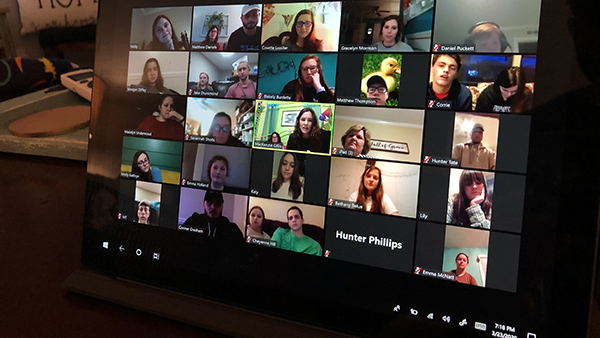Steve Thompson said he never thought the day would come when he heard his students say they were sick of their computer screens. But at Auburn University, where Thompson serves as Baptist campus minister, that’s the sentiment now — and students all across the state are right there with them.
But in the midst of all the Zoom small groups and virtual game nights, something meaningful is happening — students are getting even bolder in sharing their faith, Thompson said. And he and other Baptist campus ministers are just trying to do what they can to help “keep them on task” and help them remember that “the mission goes on even when we’re not together.”
Share your hope
To do that, the state’s Baptist campus ministers met together virtually and developed a resource called The Big 5: Action Steps to Share Your Hope in Jesus, posted at bcmlink.org.
The five steps are:
1. Have intentional conversations.
That means call or FaceTime someone and talk about Jesus, said Matt Daniels, Baptist campus minister at the University of North Alabama.
“Maybe it’s somebody in your house you need to sit down with and have this intentional conversation with,” he said. “This isn’t a text message, Snapchat, anything like that. This is a real, relational, heart-to-heart, truthful conversation.”
2. Start where you are.
Jacob Freeman, Baptist campus minister at the University of Montevallo, said this action step “encourages you to push the computer away, set your phone down for just a minute and ask God to open your eyes to the people around you.”
Look for places where you already have connections with people who need to know the hope of the gospel, he said. That could be family members, coworkers or people you know in the community.
3. Show concern.
Once you have those people in mind, identify some needs you can meet, then break those down into goals you can meet every day, said Beth Gardner, a campus minister with Metro Mobile Baptist Campus Ministries.
“You can get creative on how you want to contact people, but the important thing is connecting with them. And I do think that creating a list is going to really help you to be intentional and hold you more accountable,” she said.
4. Extend invitations.
Chris Mills, student missions strategist for the Alabama Baptist State Board of Missions, said “we’re called to be hospitable people.”
“It’s been said that the secret weapon of gospel advancement is hospitality,” he said. “It’s about engaging and doing life with others.” That could mean inviting them to a Zoom Bible study or church service and talking to them about it afterward.
5. Redeem social media.
Kim Andrews, a campus minister at the University of Alabama, encouraged students to use social media as platforms for the gospel.
“Consider what would really be engaging for you and your followers,” she said, noting one idea is to record a video of you sharing the story of how Jesus changed your life.
You also can use your Instagram story to post questions that help you gauge how people are doing, questions like “If you could describe your day in a color, what would it be and why?” or “How can I pray for you?”
Mills said the “focus is to challenge students to connect and engage during this season.”
He said he’s already been encouraged at how that’s happening at Auburn University at Montgomery, where he also currently serves as interim Baptist campus minister. One student there, Ashlee, invited a friend to join her small group on Zoom, and after the meeting was over, the friend stayed on and continued talking with Ashlee and another student.
And after that conversation, she made a commitment to follow Christ, Mills said.
Not only that — Ashlee has seen her whole calling for the next few months change.
Evangelism bears fruit
“Ashlee was scheduled to serve overseas this summer,” Mills said. “That project was canceled, and one area Ashlee was excited about in the project was learning how to be more intentional in evangelism. That desire has challenged her to be more intentional, and she has been blessed to see God bring fruit from her labor.”
Daniels said the COVID-19 crisis has pushed his BCM students to dig deep.
“The students have been engaged and seeking the Lord through all of this. They’ve been asking good questions,” he said. “They’re exploring what they believe and why they believe it.”
For instance, they’ve always heard “nothing catches God by surprise,” but now they’re wrestling with what that really means and how it impacts their daily life, Daniels said.
“They’re also learning what it means to be healthy and missional in their homes,” he said.
‘Urgency for gospel’
One student got bold enough to talk to his parents about their faith, and in response, they challenged him to lead a family Bible study.
“So now we’re talking through what that looks like,” Daniels said.
Another student had decided during their BCM “Who’s Your One?” event in the fall to reach out to a particular neighbor, and when he saw that neighbor outside recently, he turned around, went back and shared the gospel with him.
“After that conversation, the student came back with some questions about how to share with him more effectively, and we’ve been trying to equip him,” Daniels said. “That’s what we want in general — to equip students to be evangelistic in a social distancing world. Our students have loved it. There’s been a really good response so far.”
Across the state, BCMs are doing that equipping through weekly Zoom teaching, worship gatherings and small groups. They’re also continuing to meet online for accountability and to encourage each other.
“One thing it’s done for us is spark a sense of urgency to be super intentional with the days we have,” Daniels said. “It’s created a fresh sense of urgency for the gospel.”






Share with others: